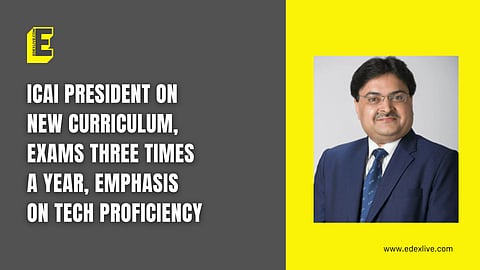ICAI President on new curriculum, exams three times a year, emphasis on tech proficiency and more
With the new curriculum implemented on July 1, 2023, aiming to shape accounting professionals in technology, ICAI has been proactive in redesigning its education and training scheme. Could you elaborate on the details of the new curriculum and how it is functioning?
Under the new scheme, four self-paced online modules have been introduced which are aligned with technology-enabled learning as advocated by the NEP, 2020.
Many new subjects have been introduced under self-paced online modules like paper on Risk Management, Sustainability Reporting, Forex and Treasury Management and Digital Ecosystem and Controls which have prominence worldwide.
The new CA curriculum provides requisite competencies through enriched learning methodologies, cogent and holistic skill assessment, effective and focussed practical training, industry orientation and a multi-disciplinary approach which integrates new-age technologies like Artificial Intelligence, Data Science and Blockchain.
Accordingly, the new scheme of education and training has been formulated in such a manner to develop global ready chartered accountants. Practical training includes a two-year examination-free period and assessments through case scenario/study-based MCQs at all levels.
What's the breakdown of the new scheme and its functioning?
Three Levels:
The course retains the three-tier structure, Foundation, Intermediate, and Final. There's also the introduction of self-paced online modules for additional learning.
Entry Routes: Two entry pathways exist, Foundation Course (for beginners) and Direct Entry Route (for graduates).
Tell us about the emphasis on technological proficiency.
The new CA curriculum at the final level emphasises technology integration, with Information Technology (IT) and ethics seamlessly woven into core papers. The curriculum incorporates comprehensive training modules under mandatory components of Information Technology and Soft Skills (ICITSS) and Advanced ICITSS.
The IT and Advanced IT courses cover an expansive range of topics, including essential software applications such as MS Word, MS PowerPoint, and MS Excel, as well as advanced areas like Data Analytics using CAAT tools such as MS Excel and IDEA.
Additionally, students gain proficiency in various accounting packages like ZOHO Books, Oracle Fusion ERP, and Tally, equipping them with practical skills for real-world scenarios.
Moreover, the curriculum delves into specialised areas such as Forensic Accounting and Fraud Detection, Digital Forensics, Cyber Security, and Robotic Process Automation. Practical aspects of auditing financial business processes using platforms like Oracle Fusion ERP and Microsoft Dynamics are also explored in depth.
Furthermore, students are exposed to data analytical tools like MS Power BI, Python, and Knime, fostering strong analytical and problem-solving abilities alongside their core accounting knowledge.
Tell us about the best phased roll-out of new curriculum.
The implementation of the new curriculum is phased to ensure a smooth transition for existing students. The inaugural exams under the new scheme will commence in May 2024 for Intermediate and Final level and June 2024 for Foundation level. A significant enrolment of 4,36,246 students has been recorded for the May exams.
What about the practical training offered?
A two-year examination-free period has been introduced, enabling trainees to fully engage in real-world scenarios uninterrupted. Moreover, mandatory training now starts post-Intermediate level attainment, ensuring students possess a solid foundation before practical training, enhancing their grasp of real-world applications.
This shift optimises the benefits and relevance of practical training for students' professional growth.
Overall, the new curriculum represents a proactive approach by ICAI to prepare accounting professionals for a tech-driven accounting landscape.
By integrating technology into education, ICAI aims to produce graduates proficient in both traditional accounting and tech-driven innovation, enhancing efficiency in accounting practices.
On July 1, 2023, ICAI launched its new scheme of education and training, wherein, the syllabus of CA course curriculum was revised after undertaking the comparative study of international accountancy bodies, the requirements under the International Education Standards (IESs) and the significant features of the new National Education Policy, 2020 (NEP) 2020. The new scheme incorporates the good practices adopted by international accountancy bodies.
Further, the requirements of IESs have been complied with in one or more subjects at different levels like integration of ethics and technology with core subjects at final level, multi-disciplinary case study at the final level, mixed of descriptive and objective types of papers at Intermediate and final levels.
Recently, ICAI has announced to conduct foundation and intermediate exams thrice a year, a move warmly welcomed by candidates who will have more chances to appear for the exam. Considering this move solely applies to only foundation and intermediate exams, can we expect similar amendment for the final exams? Additionally, could you enlighten us on other announcements we can anticipate this year?
Globally, the frequency of examinations is higher so that students can get more opportunities to appear for the exam. Bodies like CPA Australia and AICPA allow continuous exams when students are prepared.
In order to align with the best global practices and provide more opportunities to students, ICAI has decided to hold Intermediate & Foundation course examinations thrice a year: January, May/June and September, instead of twice. Whereas the CA Final exam will continue to be biannual.
This change allows students to appear for the exams every four months instead of six, benefiting those ready to test sooner and encouraging aspiring CAs to pursue their dreams promptly. The decision will benefit the students who have completed their study period to appear in the exam without waiting for two months.


